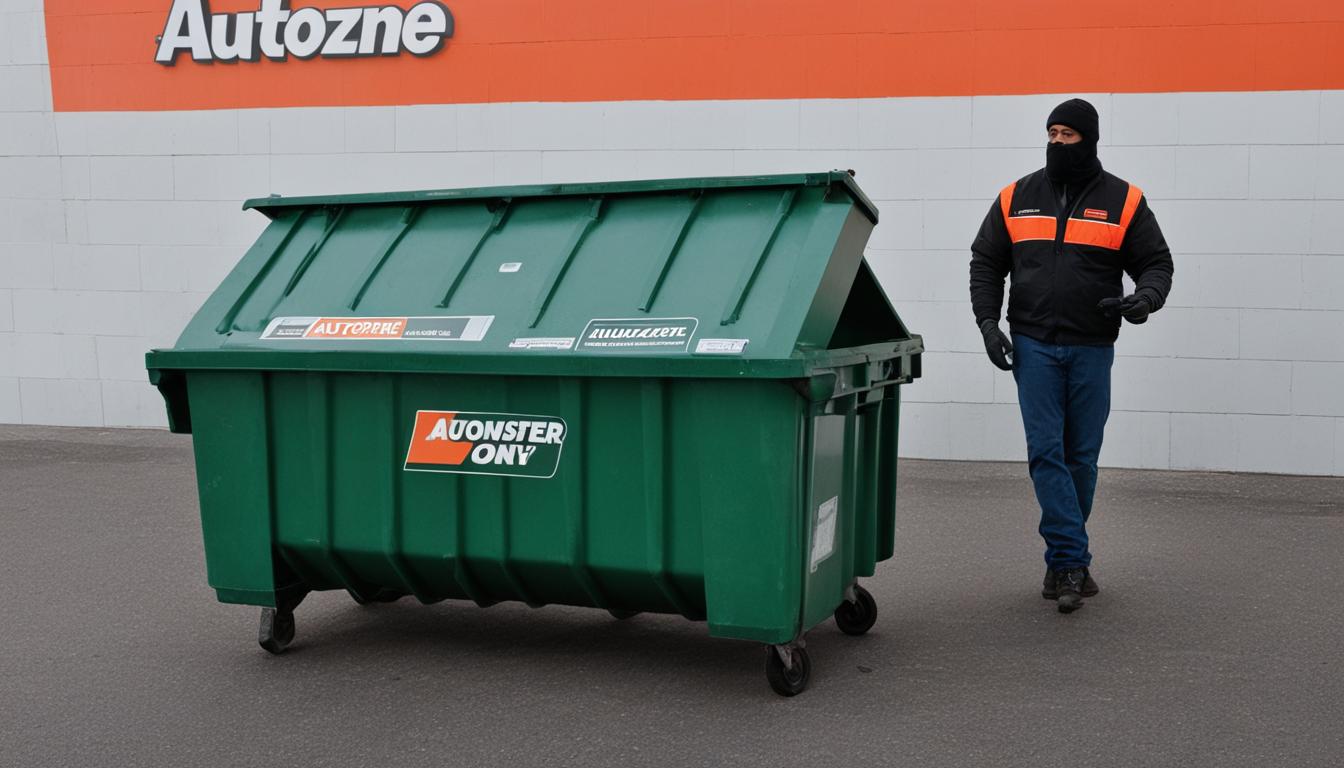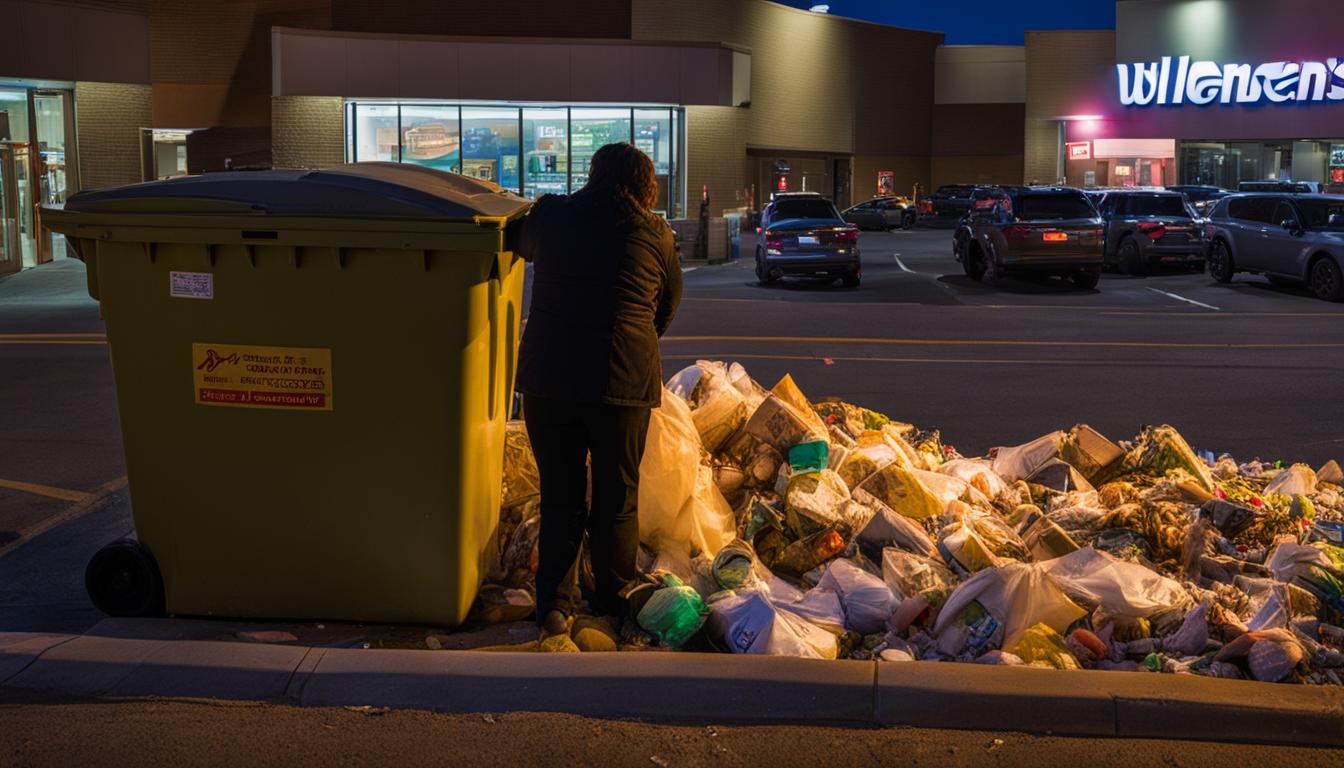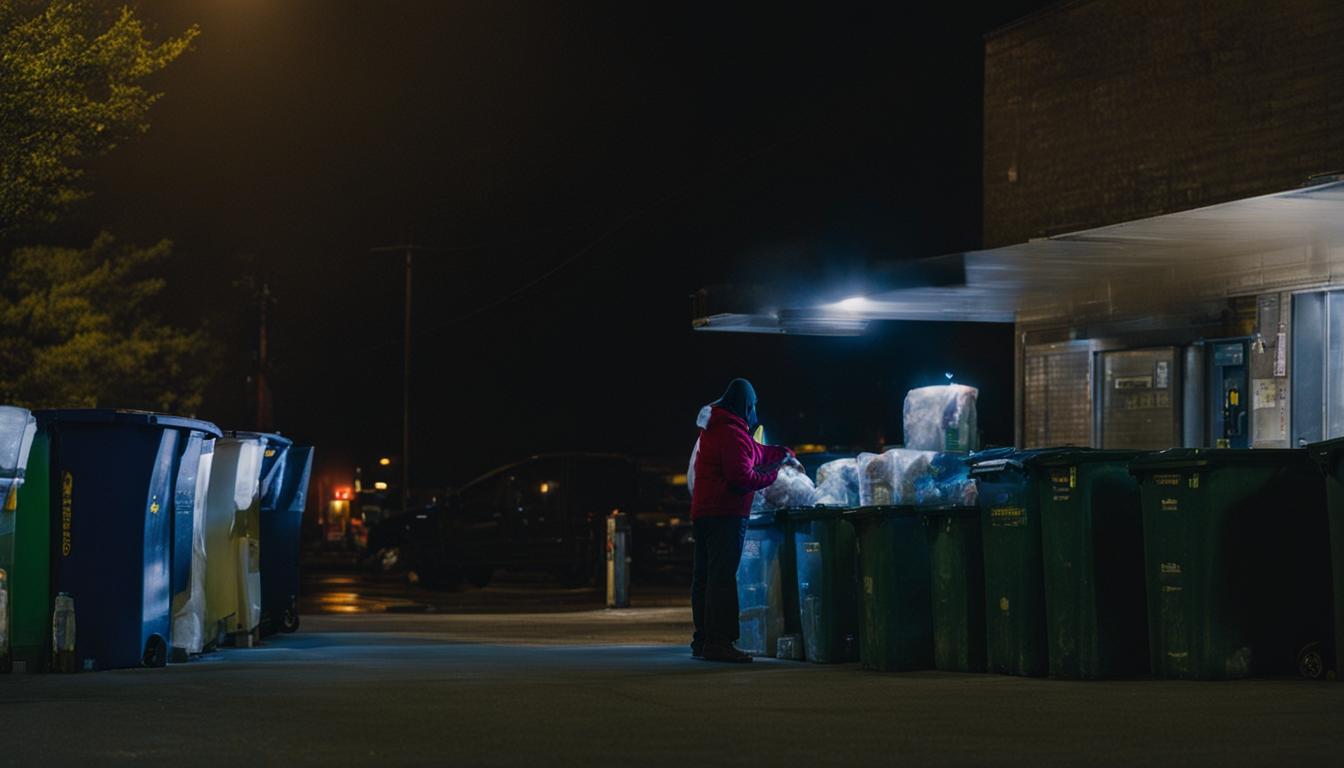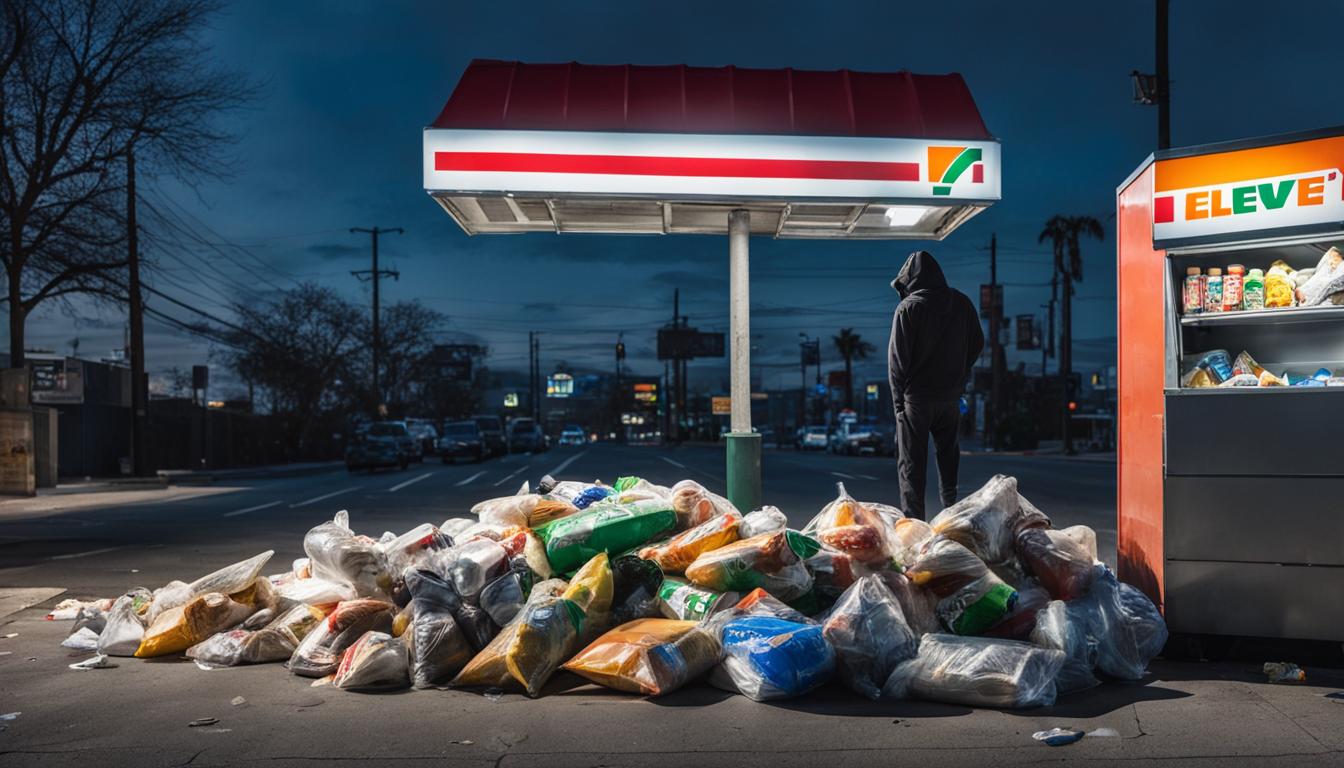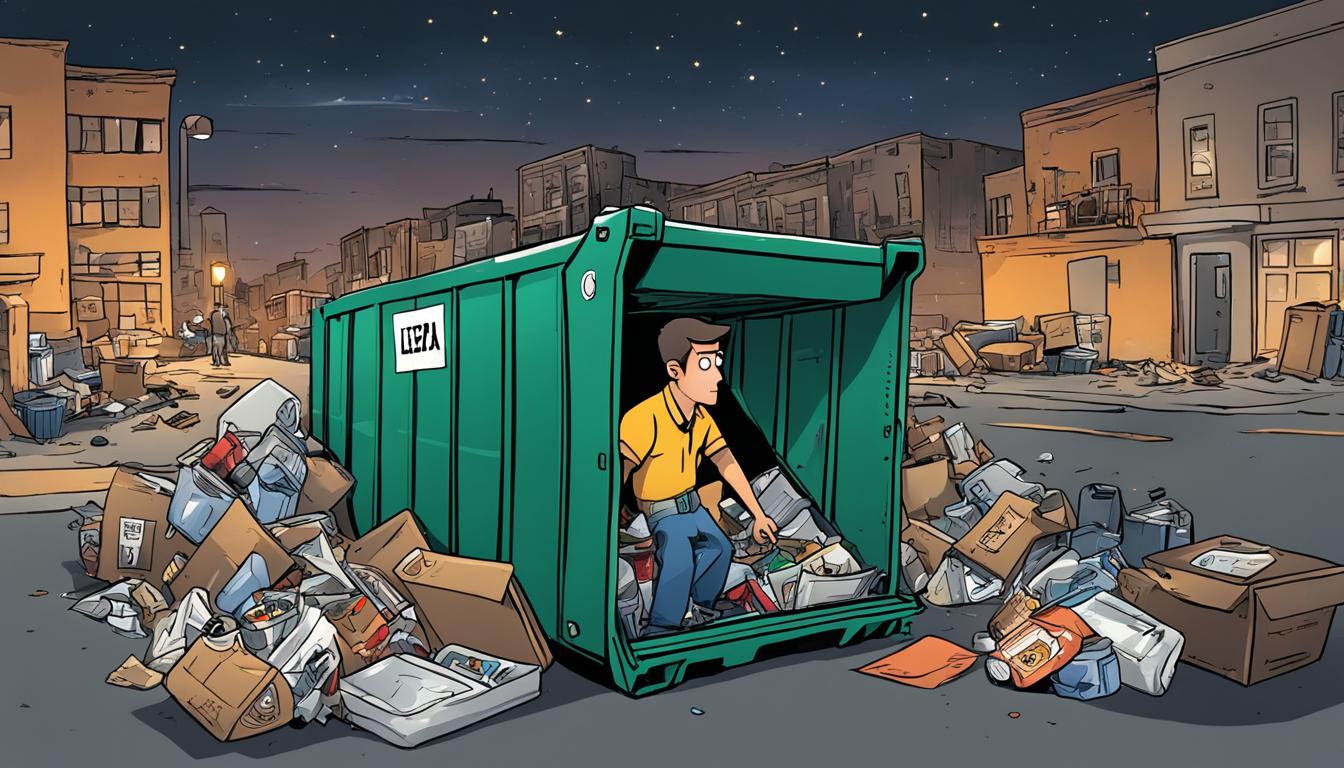Disclosure: This Post Contains Affiliate Links; We earn a commission on purchases.
Welcome to the beginner’s guide to dumpster diving! If you’re looking for a frugal way to find free food, clothes, furniture, and other valuable items, then dumpster diving might be for you. However, before you dive in, it’s important to familiarize yourself with the essentials of dumpster diving.
First and foremost, it’s crucial to understand the laws and regulations surrounding dumpster diving in your area. Some cities have specific rules regarding diving in dumpsters, while others may prohibit it altogether. Make sure you’re knowledgeable about the local regulations to avoid any legal trouble.
Next, let’s talk about safety practices. Dumpster diving can come with certain hazards, so it’s important to prioritize your well-being. Wear appropriate clothing, such as old clothes, long sleeves, long pants, and closed-toe shoes, to protect yourself from potentially unsanitary conditions. It’s also a good idea to bring gloves, a flashlight, and plastic bags for storing your finds.
Now, onto the tips. Dumpster diving is most successful in the early morning hours, before garbage trucks empty the dumpsters. Supermarkets, college dorms, and residential areas with renovation dumpsters are excellent places to find valuable items. Keep an eye out for furniture, electronics, clothing, and sealed food items. Remember to only take what you realistically need or can repurpose, and always leave the area clean.
So why should you consider dumpster diving? Apart from the potential to find free items, dumpster diving is a sustainable practice that helps reduce waste. By rescuing usable items, you’re giving them a second life instead of letting them end up in landfills. Plus, it’s a great way to save money and live more frugally.
Key Takeaways:
- Familiarize yourself with the laws and regulations for dumpster diving in your area.
- Prioritize safety by wearing appropriate clothing and using protective gear.
- Focus on prime diving spots, such as supermarkets, college dorms, and residential areas with renovation dumpsters.
- Take only what you need or can repurpose, and always leave the area clean.
- Enjoy the benefits of dumpster diving, including finding free items and reducing waste.
How to Dumpster Dive 101
When it comes to dumpster diving, there are some basic tips and techniques to keep in mind. Dumpster diving can be a rewarding way to find valuable items while reducing waste. Here are some useful tips to enhance your diving experience:
What to Wear:
In order to protect yourself from potentially unsanitary conditions, it’s crucial to wear appropriate clothing when dumpster diving. Here’s a list of recommended attire:
- Old clothes: Choose clothing that you don’t mind getting dirty or torn.
- Long sleeves and long pants: These will help protect your skin from cuts, scratches, and exposure to dirt.
- Closed-toe shoes: Wear sturdy shoes to prevent any injuries to your feet.
Tips and Techniques:
Here are some valuable tips to make your dumpster diving experience more successful:
- Bring gloves: Gloves are essential for protecting your hands from sharp objects, bacteria, and other potential hazards.
- Carry a flashlight: A flashlight will help you navigate dimly lit areas and inspect items more thoroughly.
- Carry plastic bags: Use plastic bags to store your finds and keep them organized.
- Dive early in the morning: Dumpster diving is most fruitful before garbage trucks empty the dumpsters. Try to start early to increase your chances of finding valuable items.
Best Locations:
To optimize your chances of finding valuable items, here are a few prime locations for dumpster diving:
Supermarkets: Check behind grocery stores for discarded but still usable food, including canned goods, boxed foods, and slightly bruised produce. Always exercise caution and never consume opened or spoiled food.
College Dorms: When students move out or during move-in week, college dorm dumpsters can be treasure troves for furniture and other items that students no longer need.
Residential Areas with Renovation Dumpsters: Keep an eye out for dumpsters near residential areas undergoing renovations. You may find discarded furniture, electronics, and other valuable items.
What to Look for:
While dumpster diving, be on the lookout for the following valuable items:
| Valuable Items | Description |
|---|---|
| Clothing | You might discover clothing in good condition that you can clean and wear. |
| Electronics | Unwanted electronics such as TVs, DVD players, speakers, printers, and cables may still be functional or valuable for parts. |
| Furniture | Look for pieces of furniture that can be repurposed or refurbished to fit your needs and style. |
| Sealed Food | Occasionally, you may come across sealed food items that are still safe to consume. Use your judgment and check for expiration dates. |
Remember to take only what you genuinely need or can repurpose and always clean up after yourself to leave the area as you found it.
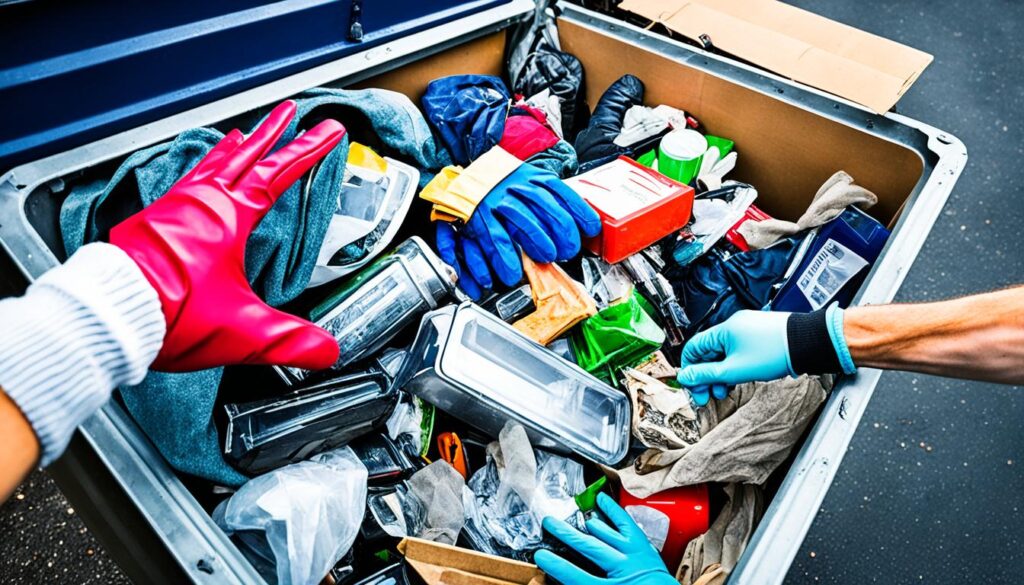
Dumpster diving can be a rewarding and eco-friendly way to find valuable items while reducing waste. By following these tips and techniques, you can make the most of your dumpster diving adventures.
Best Places to Dumpster Dive
Dumpster diving can yield great finds in various locations. Here are some of the best spots to explore:
Supermarkets
Supermarkets are a popular spot for dumpster diving, especially for finding perfectly edible food that has exceeded its use-by date. Many supermarkets dispose of unsold items, including packaged foods, fruits, and vegetables, which are often still in good condition and safe to consume. Just remember to always use your judgment and inspect the items carefully before taking them.
College Dorms
When students move out at the end of the academic year, college dorms can be a treasure trove of free furniture, electronic gadgets, and other items that they no longer need. Keep an eye out for discarded microwaves, mini-fridges, desks, chairs, and other dorm essentials. It’s not uncommon to find usable items in good condition.
Residential Areas with Renovation Dumpsters
Residential areas with ongoing renovation projects often have dumpsters filled with architectural elements, old doors, cool moldings, trims, and other valuable materials. These items can be repurposed for DIY projects or used to add unique touches to your home. Just be mindful to only take what you need and respect private property.
Additionally, consider exploring your city for smaller groupings of businesses, independent furniture stores, and flooring stores. These areas may have unlocked dumpsters where people dispose of almost perfect items that they no longer want. You might be surprised at the quality and variety of treasures you can find in these lesser-known locations.
Remember, while dumpster diving can be an exciting and rewarding activity, it’s important to always follow local laws and regulations, respect private property, and prioritize safety. Happy diving!
What Can You Find in a Dumpster?
When it comes to dumpster diving, the possibilities of what you can find are truly endless. Depending on your luck and the location you choose, valuable items are waiting to be discovered. Here are some of the common treasures you may stumble upon during your diving adventures:
| Category | Examples |
|---|---|
| Footwear and Clothing | Shoes, boots, clothes, accessories |
| Electronics | Televisions, DVD players, speakers, printers, cables |
| Furniture | Chairs, tables, shelves, lamps |
| Sealed Food | Canned goods, boxed cereals, slightly bruised fruits, bread |
| Other Valuables | Decorations, wood/lumber, tools, books |
It’s important to exercise caution and use your judgment when deciding which items to take. Make sure they are safe, useful, and in good condition. Avoid perishable products like seafood, sprouts, meat, dairy, and unpasteurized juice. Instead, focus on sealed food items that are still within their expiration dates.
Remember, dumpster diving is not only about obtaining free items but also about reducing waste and repurposing what others consider as trash. By being mindful of what you take and using your finds responsibly, you can contribute to a more sustainable lifestyle.
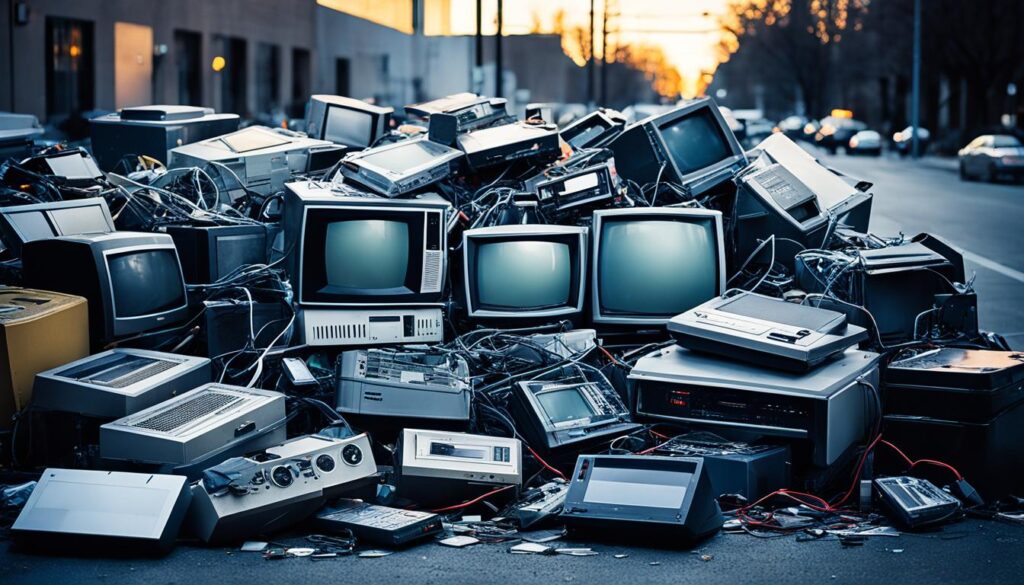
Always keep in mind that taking from dumpsters may be regulated by local laws and regulations. Familiarize yourself with the rules in your area to ensure a legal and safe diving experience.
Conclusion
Dumpster diving can be an exciting and rewarding activity that not only helps reduce waste but also saves you money. However, it is crucial to prioritize safety and follow best practices to ensure a positive experience. Before you begin, familiarize yourself with your local laws and regulations regarding dumpster diving. This will help you avoid any legal issues and ensure that you stay within the boundaries of what is permissible in your area.
Another essential aspect of dumpster diving is practicing safety measures. Always wear appropriate clothing, including long sleeves, long pants, closed-toe shoes, and gloves, to protect yourself from potential hazards and unsanitary conditions. Additionally, bring essential equipment like a flashlight and plastic bags to safely store your finds. By taking these precautions, you can minimize the risks associated with dumpster diving and enjoy the process safely.
One of the most significant benefits of dumpster diving is the opportunity to find free food, clothing, furniture, and various valuable items. This practice promotes sustainability by reducing waste and giving discarded items a new lease on life. By making use of what others consider as trash, you can save money and reduce your ecological footprint. Dumpster diving can be a great way to live frugally while minimizing your impact on the environment. However, always exercise common sense and make informed decisions when selecting items, ensuring that they are safe and useful.
So, embrace dumpster diving as an environmentally friendly and cost-effective way to find valuable treasures. By following safety practices and cultivating a discerning eye for valuable items, you can embark on an exciting journey filled with discoveries. Happy diving!
Source Links
- https://www.wikihow.com/Dumpster-Dive
- https://www.thebrokebackpacker.com/dumster-diving-for-dummies/
- https://www.kellyelko.com/dumpster-diving-tips-from-a-pro/

Subscribe to Our Newsletter


